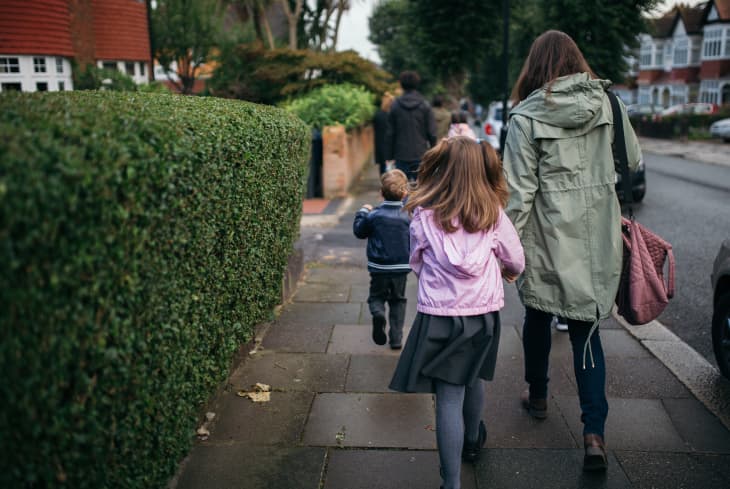3 Nonobvious Reasons You Shouldn’t Overlook Buying a House Next to a School

As a real estate writer, it’s my job to scan real estate listings. Lately, I’ve had my eye on Jersey Shore properties, which can range from beachside palaces to dilapidated “fixer-uppers.” I was surprised to find one well-priced property that had been on the market for a while despite a recent price slash. From the pictures, it had nice curb appeal, and the interior looked move-in ready. So why was the For Sale sign still up?
I had a hunch the home’s lengthy time on the market had to do with more than the house itself. I entered the address into Google Maps for a better glimpse of the neighboring homes. They looked similar in size and style, with no red flags like junk-filled yards or driveways.
Hmm. I swiped my screen to get the view across the street. And there it was: a schoolyard. A closer look at the map confirmed it belonged to a middle school. Could the proximity to lunchtime recess be the reason this otherwise desirable listing was still on the market?
It’s a pretty big deal for parents of school-age children to live near a “good” school. But what about living smack dab across the street from one? Here’s what some homeowners and real estate agents from around the country had to say about the pros and cons of having a school, whether deemed “good” or “bad,” for a neighbor.
The Pros of Living Near a School
Convenient school drop-off. This one’s a no-brainer: Parents will likely rejoice if their child’s school is within walking distance from their homes. Just as you’d factor in a work commute when purchasing a new home, suburban homebuyers especially should consider how long the car line will take to drop off the kiddos in the mornings and afternoons.
Higher property values. It bears noting that what makes a school “good” or “bad” extends far outside of the purview of this writer and publication. However, if you are indeed looking at a home near what is considered an excellent school, you can expect to pay more for it now and sell it for even more later, says Eric Bramlett, a Realtor and owner of Bramlett Real Estate in Austin. “Many people want to live near good schools, so these homes are worth more.”
It’s important to think beyond the current school year, though. Bramlett says as schools get bigger or change over the years, your home could be affected. “Make sure there are no future school plans that could cause problems,” he says.
You’ve got school spirit (yes, you do). Brittany Anas, a Denver-based travel and real estate writer, recently sold her house across the street from an alternative high school. “I lived in it for 12 years and loved being across from a school because I felt like it brought vibrancy and energy to the neighborhood,” she says.
Anas enjoyed her front-row seat to the school spirit show, especially in autumn. Her home was in earshot of the cheers erupting from Friday night football games, and it was also on the homecoming parade route, offering a terrific view of the school’s marching band in all its glory. Aside from the joyous times, she was privy to student protests and walkouts, too. “I enjoyed hearing about the causes they were passionate about,” Anas says.
The Cons of Living Near a School
Limited street parking. Anas says she didn’t mind students parking in front of her house during the school day, but other homeowners — especially those without driveways — might not be so amenable. Plus, unless there’s a large parking lot on the campus, expect to find limited street parking on school days.
More traffic and more noise. Sarah Bronstein, a Realtor in Asheville, North Carolina, tells her buyers to consider traffic and noise issues if the property they seek is near a school. While this isn’t typically an issue for Asheville homeowners — many properties there are set back from the road by long driveways — she notes it’s something for homebuyers to consider.
“I recommend that clients visit the property during drop-off and pick-up to understand the traffic and flow with buses and crosswalks,” Bronstein says.
Lisa Smid owns a condo across the street from a high school campus in Nashville, Tennessee. She notes that the school has its own rush hours from 6 to 7 a.m. and 2 to 3 p.m., compounded by “normal” rush hours. She avoids running errands during any of it, adding, “Friday at 2 is no time for a leisurely neighborhood walk.”
Smid also notes the library and other businesses in the area are often busy and full after school lets out, so planning is essential. “For me, the school is not a dealbreaker, but [as a buyer] you have to consider why you want this location and when you’ll be out on the road or available to visit the places you want to be convenient,” she says.
Living Near a School: A+ or F?
Cari McGee , a Broker/Realtor Team Lead at Re/Max Northwest in Tri-Cities, Washington, says a property’s proximity to a school will likely be one of many factors buyers consider when house hunting, which should give anyone concerned about resale some peace of mind.
“You’re not necessarily limiting your buyer pool for resale when you buy a house by a school, but you’re also not appealing to absolutely everyone,” McGee says.